Principal Investigators
 Christian Kray is a Professor for Geoinformatics at the Institute for Geoinformatics (ifgi) at the University of Münster, Germany. Chris’ research covers a broad range of topics in Geoinformatics that relate to interaction with and through spatial concepts (e.g. using proximity regions around devices to trigger certain actions). He is particularly interested in smart cities, location-based services and supporting participation and collaboration on topics that have a strong spatial component (such as urban planning). He has pioneered evaluation and design methods using immersive video environments that are augmented with additional content and provide an interesting middle-ground between lab-based and field-based work. He holds a PhD in Computer Science from Saarland University and worked as a postdoctoral researcher at Lancaster University. Prior to coming to ifgi, he was a senior lecturer at the Computing Department at Newcastle University, UK.
Christian Kray is a Professor for Geoinformatics at the Institute for Geoinformatics (ifgi) at the University of Münster, Germany. Chris’ research covers a broad range of topics in Geoinformatics that relate to interaction with and through spatial concepts (e.g. using proximity regions around devices to trigger certain actions). He is particularly interested in smart cities, location-based services and supporting participation and collaboration on topics that have a strong spatial component (such as urban planning). He has pioneered evaluation and design methods using immersive video environments that are augmented with additional content and provide an interesting middle-ground between lab-based and field-based work. He holds a PhD in Computer Science from Saarland University and worked as a postdoctoral researcher at Lancaster University. Prior to coming to ifgi, he was a senior lecturer at the Computing Department at Newcastle University, UK.
Recent and ongoing research projects that Chris led or was involved in include Dist-KISS (investigating distance-keeping during COVID), SIMPORT (focusing on enabling users of location-based services to take control of their personal location information) and IIP (facilitating bicycle-based commuting). Chris also served as a scientific coordinator for the ITN GEO-C (Enabling Open Cities) and was a principal investigator on the ITN DCOMM (Deictic Communication). More information about Chris’ research can be found here. In SCALA, Chris serves as the overall project coordinator.
 Kenny Coventry is a psychological scientist, with specific expertise in human communication and decision making. His main research area is investigating how different mental abilities in the mind/brain interact. This has been manifest in a long-standing interest in the relationship between language and perception, and the mapping between language and the vision and action systems in particular. A second interest is how cognition and emotion interact in decision making under conditions of uncertainty. More information about Kenny’s research and publications can be found here.
Kenny Coventry is a psychological scientist, with specific expertise in human communication and decision making. His main research area is investigating how different mental abilities in the mind/brain interact. This has been manifest in a long-standing interest in the relationship between language and perception, and the mapping between language and the vision and action systems in particular. A second interest is how cognition and emotion interact in decision making under conditions of uncertainty. More information about Kenny’s research and publications can be found here.
After studying psychology at Glasgow University, he completed a PhD in Cognitive Science and Psychology at Edinburgh University (with a thesis on spatial language). This was followed by posts at the University of Dundee, Plymouth University, Northumbria University Newcastle (including Associate Dean Research and Enterprise, and Director of the Cognition and Communication Research Centre), and visiting Professorships at Bremen and Freiburg Universities (collaborating with the Deutsche Forschungsgemeinschaft SFB-TR8 Spatial Cognition Research Centre). He is also a former Fellow of the Hanse Institute for Advanced Studies, Germany.
He took up the post of inaugural Head of the School of Psychology at the University of East Anglia in 2012. In SCALA, Kenny serves as the scientific coordinator.
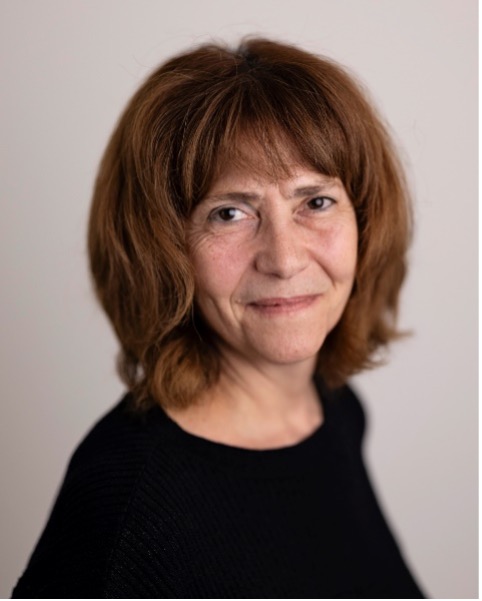
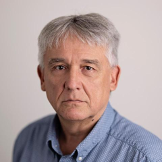 Prof. Mila Vulchanova and Dr. Valentin Vulchanov (Norwegian University of Science & Technology, Trondheim): Our research agenda and expertise include advanced experimental work in cognition in its relationship to language competence, language use, language development and the cognitive and language profiles of atypical populations (autism, dyslexia, developmental language disorder). In a series of studies, we have contributed to the study of spatial cognition and spatial communication across languages and cultures, the interaction between language and spatial cognition, both in neurotypical and atypical populations and the mechanisms which explain this dynamic interaction. Recent relevant publications include:
Prof. Mila Vulchanova and Dr. Valentin Vulchanov (Norwegian University of Science & Technology, Trondheim): Our research agenda and expertise include advanced experimental work in cognition in its relationship to language competence, language use, language development and the cognitive and language profiles of atypical populations (autism, dyslexia, developmental language disorder). In a series of studies, we have contributed to the study of spatial cognition and spatial communication across languages and cultures, the interaction between language and spatial cognition, both in neurotypical and atypical populations and the mechanisms which explain this dynamic interaction. Recent relevant publications include:
Coventry, K., Gudde, H., Diessel, H., Collier, J., Guijarro-Fuentes, P., Vulchanova, M. et al. (2023). Spatial communication systems across languages reflect universal action constraints. Nature Human Behaviour.https://doi.org/10.1038/s41562-023-01697-4
Vulchanova, M., Vulchanov, V., Fritz, I., Milburn, E. A. (2019) Language and perception: Introduction to the special issue “Speakers and listeners in the visual world”. Journal of Cultural Cognitive Science, vol. 3 (2). https://doi.org/10.1007/s41809-019-00047-z
Bochynska, A., Coventry, K. R., Vulchanov, V., & Vulchanova, M. (2020). Tell me where it is: Selective difficulties in spatial language on the autism spectrum. Autism, 24( 7 ), 174 0 –1757. https://doi.org/10.1177/1362361320921040
Larson, C., Bochynska, A. & Vulchanova, M. (2024). Mental rotation and language in autism spectrum disorder. Autism Research. https://doi.org/10.1002/aur.3128
More Information about Mila’s and Valentin’s research can be found here.
 Olga Capirci is currently Research Director at the CNR’s Institute of Cognitive Sciences and Technologies, Coordinator of LaCAM (Language and Communication Across Modalities Laboratory), Coordinator of the Action, Gesture, and Sign language (AG&S) Research Unit. She is also professor in “Language and Communication” and in “Typical and atypical development and early intervention” at the International Telematic University Uninettuno. She has been working at ISTC since 1992 and most of her work to date has been dedicated to the study of the co-development of language and perceptuo-motor processes, conceiving language acquisition as semantically driven and embodied. In particular, her research has contributed to enhancing the relevance of a multimodal approach to communication; considering different modalities of expression (e.g. speech, gesture, signs) in children with typical and atypical development (e.g. deaf children, Down syndrome, Williams syndrome, and autistic spectrum disorders) at different ages and within different interaction contexts and cognitive tasks. Her current efforts are focused on the study of the progression from action to language – spoken and signed – and on the continuity from gesture to sign. Within an embodied approach to semantics, she is currently investigating the role of iconic structures in sign languages. She is currently PI for the CNR Unit of other 3 research projects:
Olga Capirci is currently Research Director at the CNR’s Institute of Cognitive Sciences and Technologies, Coordinator of LaCAM (Language and Communication Across Modalities Laboratory), Coordinator of the Action, Gesture, and Sign language (AG&S) Research Unit. She is also professor in “Language and Communication” and in “Typical and atypical development and early intervention” at the International Telematic University Uninettuno. She has been working at ISTC since 1992 and most of her work to date has been dedicated to the study of the co-development of language and perceptuo-motor processes, conceiving language acquisition as semantically driven and embodied. In particular, her research has contributed to enhancing the relevance of a multimodal approach to communication; considering different modalities of expression (e.g. speech, gesture, signs) in children with typical and atypical development (e.g. deaf children, Down syndrome, Williams syndrome, and autistic spectrum disorders) at different ages and within different interaction contexts and cognitive tasks. Her current efforts are focused on the study of the progression from action to language – spoken and signed – and on the continuity from gesture to sign. Within an embodied approach to semantics, she is currently investigating the role of iconic structures in sign languages. She is currently PI for the CNR Unit of other 3 research projects:
The Learning for all project (L4ALL) MISE (funded by PNRR 2023-2026), in the field of Key Enabling Technology, which aims to develop Artificial-Human Avatar for translation into Sign Language.
The Bag-SIGN Project Erasmus+ Cooperation partnership (2022-2025): Be Aware of the Grammars of Sign Languages. Resources for Teachers and Pupils. The DREAM Projec, funded by the Italian Ministry of Research (PRIN MIUR 2024 – 2026) on autism: Disentangling heteRogeneity in autism: from EArly motor markers to individual treatment responses through a Machine learning approach. She has published with deaf and hearing colleagues several publications in international scientific journals. She is member of the International Society for Gesture Studies and member of the CNR interdepartmental working group on Accessibility and Universal Design. More information about Olga’s research can be found here.
 Mikkel Wallentin (top image) is a professor in Cognitive Science at Aarhus University, and Andreas Højlund (bottom image) is an assistant professor in Cognitive Science at Aarhus University. Both have double affiliations with the Department of Linguistics, Cognitive Science and Semiotics at Aarhus University and Centre of Functionally Integrative Neuroscience (CFIN) at Aarhus University Hospital. Their collaborative research has focused on the neural underpinnings of language and communication
Mikkel Wallentin (top image) is a professor in Cognitive Science at Aarhus University, and Andreas Højlund (bottom image) is an assistant professor in Cognitive Science at Aarhus University. Both have double affiliations with the Department of Linguistics, Cognitive Science and Semiotics at Aarhus University and Centre of Functionally Integrative Neuroscience (CFIN) at Aarhus University Hospital. Their collaborative research has focused on the neural underpinnings of language and communication  using both fMRI, EEG and MEG, both in healthy samples and in Parkinson’s disease. As can be seen from their publications, both Mikkel Wallentin and Andreas Højlund have highly interdisciplinary track records with work ranging from tests of musical competence via sex chromosome anomalies to deep brain stimulation. Their common goal throughout is to conduct rigorous and critical science of high quality while remaining curious and having fun.
using both fMRI, EEG and MEG, both in healthy samples and in Parkinson’s disease. As can be seen from their publications, both Mikkel Wallentin and Andreas Højlund have highly interdisciplinary track records with work ranging from tests of musical competence via sex chromosome anomalies to deep brain stimulation. Their common goal throughout is to conduct rigorous and critical science of high quality while remaining curious and having fun.
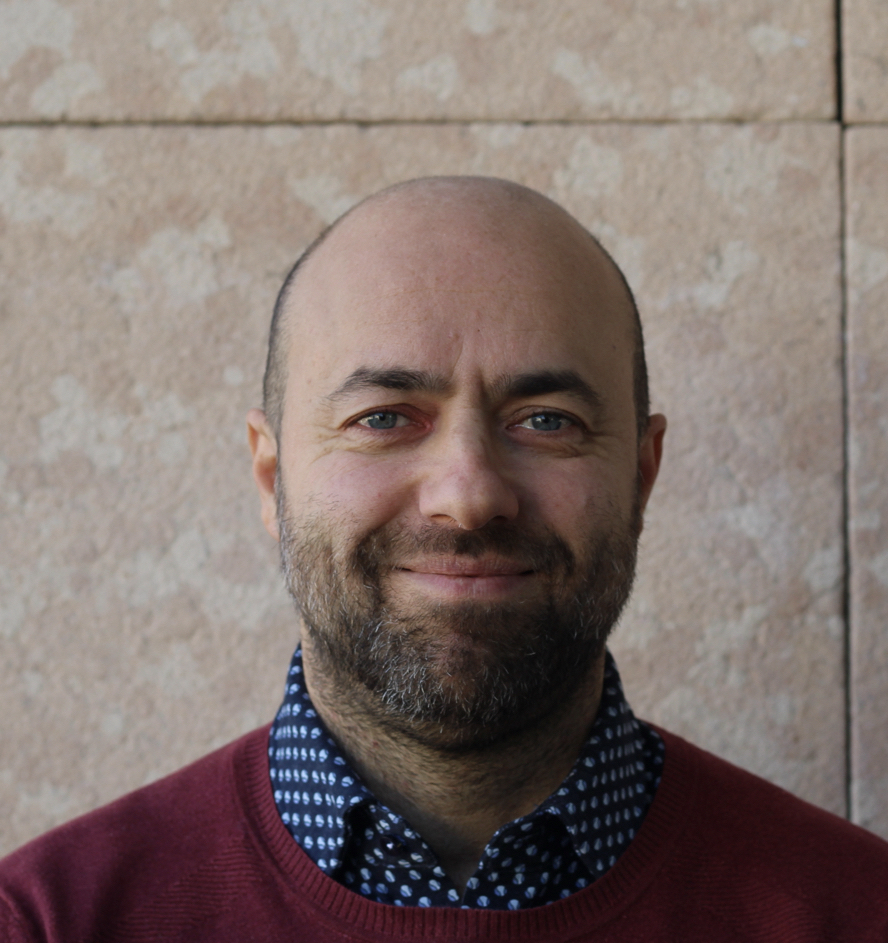 Filippo Cavallo is Associate Professor in Biomedical Robotics and Biomechatronics at the University of Florence, Department of Industrial Engineering, Florence, Italy. He received the Master Degree in Electronics Engineering, Curriculum Bioengineering, from the University of Pisa, Italy, and the Ph.D. degree in Bioengineering at the BioRobotics Institute of Scuola Superiore Sant’Anna, Pisa, Italy. From 2007 to 2013, he was postdoc researcher and, from 2013 to 2019, he was assistant professor and head and scientific responsible of the Assistive Robotics Lab at the BioRobotics Institute, Scuola Superiore Sant’Anna. Since 2020, he is an associate professor with the University of Florence in Biomedical Robotics and Bio-Mechatronics and an affiliate professor at the BioRobotics Institute, Scuola Superiore Sant’Anna. The objectives of his research activities are to promote and evaluate novel service robotics for active and healthy ageing, and to identify and validate disruptive healthcare paradigms for neurodegenerative and chronic diseases, focusing on prevention and support for physical and cognitive declines. The main scientific and technological challenges concern social robotics, human-robot interaction, wearable sensors, Internet of Things, and artificial intelligence for robot companion and healthcare applications. He has participated in various national and European projects and is the author of 180+ papers at conferences and ISI journals (Google Scholar, ResearchGate).
Filippo Cavallo is Associate Professor in Biomedical Robotics and Biomechatronics at the University of Florence, Department of Industrial Engineering, Florence, Italy. He received the Master Degree in Electronics Engineering, Curriculum Bioengineering, from the University of Pisa, Italy, and the Ph.D. degree in Bioengineering at the BioRobotics Institute of Scuola Superiore Sant’Anna, Pisa, Italy. From 2007 to 2013, he was postdoc researcher and, from 2013 to 2019, he was assistant professor and head and scientific responsible of the Assistive Robotics Lab at the BioRobotics Institute, Scuola Superiore Sant’Anna. Since 2020, he is an associate professor with the University of Florence in Biomedical Robotics and Bio-Mechatronics and an affiliate professor at the BioRobotics Institute, Scuola Superiore Sant’Anna. The objectives of his research activities are to promote and evaluate novel service robotics for active and healthy ageing, and to identify and validate disruptive healthcare paradigms for neurodegenerative and chronic diseases, focusing on prevention and support for physical and cognitive declines. The main scientific and technological challenges concern social robotics, human-robot interaction, wearable sensors, Internet of Things, and artificial intelligence for robot companion and healthcare applications. He has participated in various national and European projects and is the author of 180+ papers at conferences and ISI journals (Google Scholar, ResearchGate).
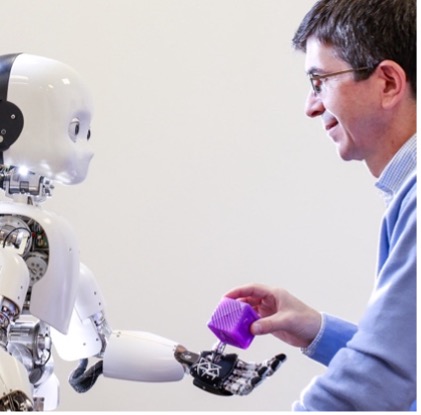 Angelo Cangelosi is Professor of Machine Learning and Robotics at the University of Manchester (UK) and co-director of the Manchester Centre for Robotics and AI. He was selected for the award of the European Research Council (ERC) Advanced grant (UKRI funded). He has hold various visiting/honorary position in UK and international institutions, e.g. Turing Fellow at the Alan Turing Institute London, Visiting Professor at Hohai University, and Visiting Distinguished Fellow at AIST-AIRC Tokyo. His research interests are in developmental robotics, language grounding, human robot-interaction and trust, and robot companions for health and social care. Previously Angelo was Professor of Artificial Intelligence and Cognition, and founding director role, at the Centre for Robotics and Neural Systems at Plymouth University (UK). Cangelosi studied psychology and cognitive science at the Universities of Rome La Sapienza and at the University of Genoa, and was visiting scholar at the University of California San Diego and the University of Southampton.
Angelo Cangelosi is Professor of Machine Learning and Robotics at the University of Manchester (UK) and co-director of the Manchester Centre for Robotics and AI. He was selected for the award of the European Research Council (ERC) Advanced grant (UKRI funded). He has hold various visiting/honorary position in UK and international institutions, e.g. Turing Fellow at the Alan Turing Institute London, Visiting Professor at Hohai University, and Visiting Distinguished Fellow at AIST-AIRC Tokyo. His research interests are in developmental robotics, language grounding, human robot-interaction and trust, and robot companions for health and social care. Previously Angelo was Professor of Artificial Intelligence and Cognition, and founding director role, at the Centre for Robotics and Neural Systems at Plymouth University (UK). Cangelosi studied psychology and cognitive science at the Universities of Rome La Sapienza and at the University of Genoa, and was visiting scholar at the University of California San Diego and the University of Southampton.
He currently is Principal investigator for the ongoing projects ERC Advanced “eTALK” (2024-29, €2.5m), CRADLE Prosperity (EPSRC 2023-28, £4m), “EnTRUST (UKRI/EPSRC TAS Node on Trust, 2020-24, £1m), “CRADLE++” (US Air Force Office of Science and Research, 2018-2023, $1m) and the Horizon projects PRIMI, MSCA PERSEO, MSCA TRAIL, MSCA SCALA. He was the coordinator of the EU H2020 Marie Skłodowska-Curie European Industrial Doctorate “APRIL: Applications of Personal Robotics through Interaction and Learning” (2016-2019). Overall, he has secured over £35m of research grants as coordinator/PI. Cangelosi has produced more than 350 scientific publications, and has been general/bridging chair of numerous workshops and conferences including the IEEE ICDL-EpiRob Conferences (Frankfurt 2011, Osaka 2013, Lisbon 2017, Tokyo 2018, Beijing 2021). In 2012-13 he was Chair of the IEEE Technical Committee on Autonomous Mental Development. Cangelosi is Editor of the journals Interaction Studies and IET Cognitive Computation and Systems, and in 2015 was Editor-in-Chief of IEEE Transactions on Autonomous Development. His book “Developmental Robotics: From Babies to Robots” (MIT Press) was published in January 2015, and recently translated in Chinese and Japanese. His latest book “Cognitive Robotics” (MIT Press), coedited with Minoru Asada, was published in 2022. More information about his working group can be found here.
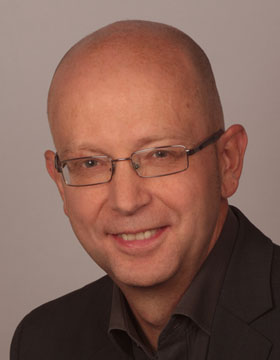 Holger Diessel is Professor of English Linguistics at the Friedrich-Schiller-Universität Jena. He received a Ph.D. in General Linguistics from the University of Buffalo in 1998. From 1998 to 2004 he was a postdoctoral researcher at the Max Planck Institute for Evolutionary Anthropology in Leipzig in the Department of Developmental and Comparative Psychology. He was a Senior Fellow at the Freiburg Institute for Advanced Studies (2011) and at the Wissenschaftskolleg zu Berlin (2015-16). He is a member of the Saxon Academy of Sciences (since 2014) and was awarded the Francqui Chair of Linguistics at the University of Leuven (in 2021).
Holger Diessel is Professor of English Linguistics at the Friedrich-Schiller-Universität Jena. He received a Ph.D. in General Linguistics from the University of Buffalo in 1998. From 1998 to 2004 he was a postdoctoral researcher at the Max Planck Institute for Evolutionary Anthropology in Leipzig in the Department of Developmental and Comparative Psychology. He was a Senior Fellow at the Freiburg Institute for Advanced Studies (2011) and at the Wissenschaftskolleg zu Berlin (2015-16). He is a member of the Saxon Academy of Sciences (since 2014) and was awarded the Francqui Chair of Linguistics at the University of Leuven (in 2021).
Holger is interested in a wide range of topics in functional and cognitive linguistics, including language acquisition and language change, linguistic typology and language universals, construction grammar, and spatial language and cognition. His publications include more than 60 articles and book chapters and four monographs: Demonstratives. Form, Function and Grammaticalization (Benjamins 1999), The Acquisition of Complex Sentences (Cambridge 2004), The Grammar Network. How Linguistic Structure is Shaped by Language Use (Cambridge 2019), and The Constructicon. Taxonomies and Networks (Cambridge 2023). More information about his research activities is available here.
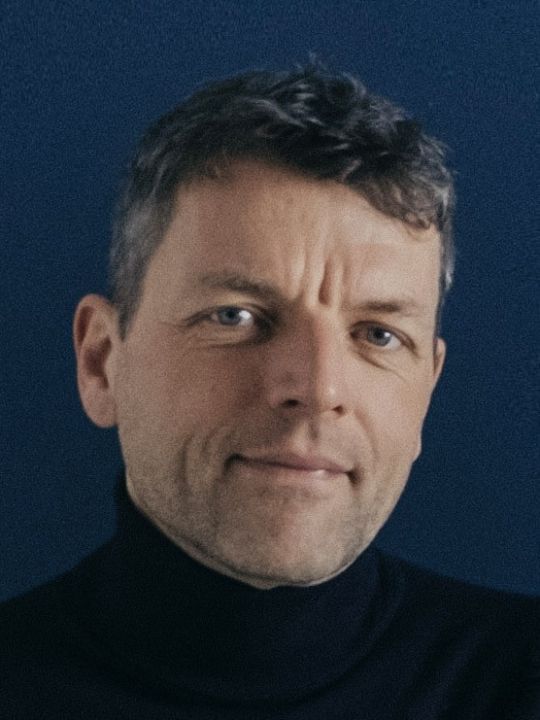 Gernot Bauer is a computer science Professor at FH Münster University of Applied Sciences with a focus on software engineering and human-computer interaction. His interest in using digital media and applications to reflect on societal challenges and to contribute to their solution led to founding the “Institut für Gesellschaft und Digitales” (GUD) at FH Münster. With Naviki, an internationally popular bicycle route planner has emerged in his group, meanwhile being further developed by beemo GmbH, a spin-off from FH Münster. Gernot holds a diploma in physics (University of Cologne) and a PhD in mathematics (LMU Munich).
Gernot Bauer is a computer science Professor at FH Münster University of Applied Sciences with a focus on software engineering and human-computer interaction. His interest in using digital media and applications to reflect on societal challenges and to contribute to their solution led to founding the “Institut für Gesellschaft und Digitales” (GUD) at FH Münster. With Naviki, an internationally popular bicycle route planner has emerged in his group, meanwhile being further developed by beemo GmbH, a spin-off from FH Münster. Gernot holds a diploma in physics (University of Cologne) and a PhD in mathematics (LMU Munich).
 Matthias Pawlowski, MD, PhD is a board-certified neurologist and ICU-specialist. He studied medicine in Münster, Cardiff, and New York. He received his medical degree from the University of Münster, Germany, and defended his PhD thesis on stem cell research in the Cambridge Stem Cell Institute, University of Cambridge, UK in 2016. Currently, he is a consultant in the Department of Neurology and Head of the Dementia-sensitive Hospital, University Hospital Münster, Germany. He is Principal Investigator in several treatment trials for Alzheimer disease. His research focuses on clinical and molecular biomarkers and mechanisms of neurodegenerative diseases.
Matthias Pawlowski, MD, PhD is a board-certified neurologist and ICU-specialist. He studied medicine in Münster, Cardiff, and New York. He received his medical degree from the University of Münster, Germany, and defended his PhD thesis on stem cell research in the Cambridge Stem Cell Institute, University of Cambridge, UK in 2016. Currently, he is a consultant in the Department of Neurology and Head of the Dementia-sensitive Hospital, University Hospital Münster, Germany. He is Principal Investigator in several treatment trials for Alzheimer disease. His research focuses on clinical and molecular biomarkers and mechanisms of neurodegenerative diseases.
